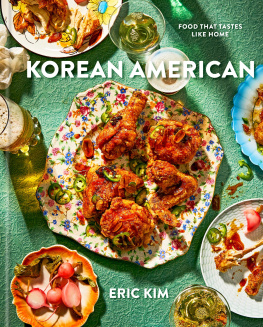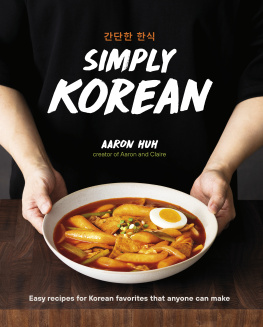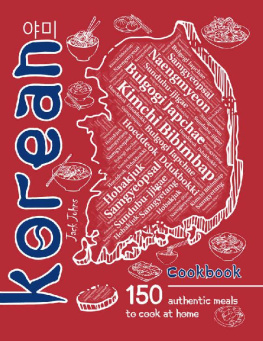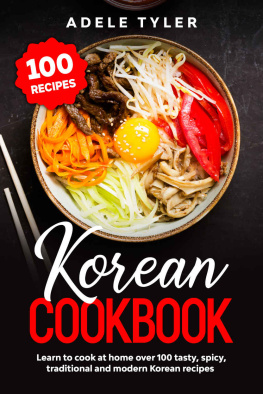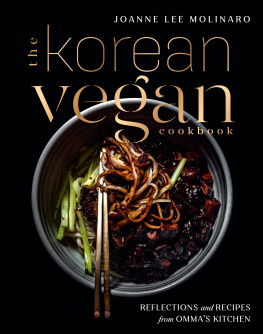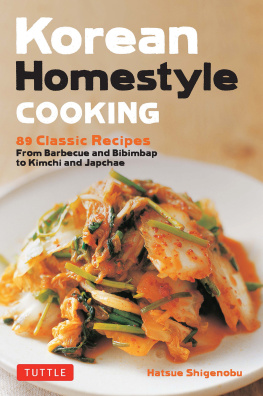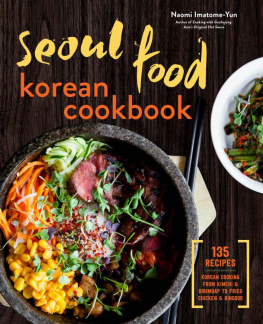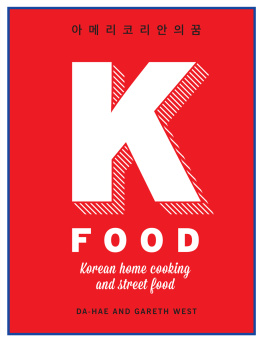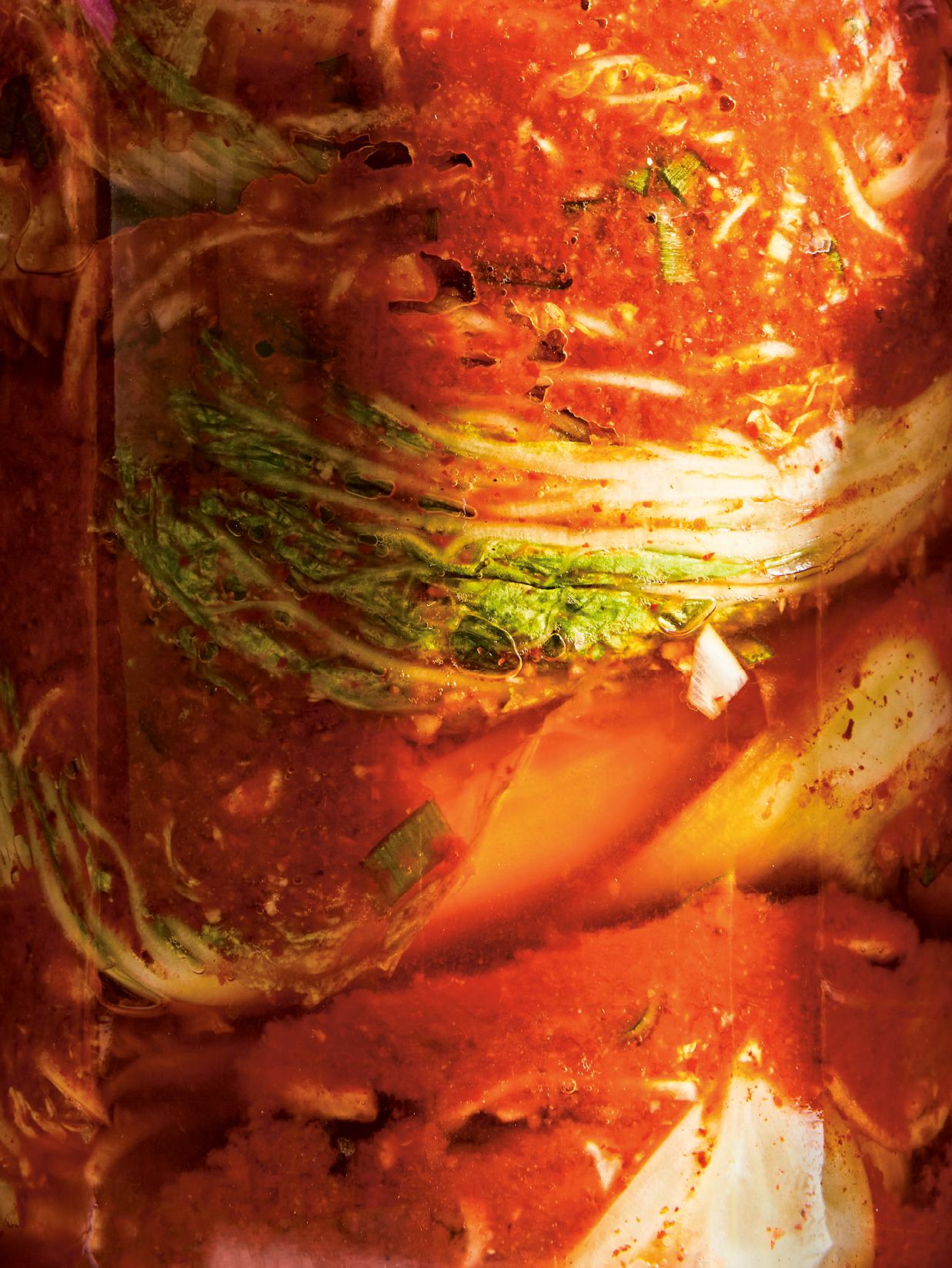Contents
Landmarks
Acknowledgments
As with everything else in my life, the story of this book starts with Jean, to whom I owe everything. I am who I am because of you, Mom, and its been the greatest honor of my life getting to know you better this year, not just as a mother, a daughter, a sister, and a cook, but also as a person.
Thank you to my familyDad, Kevin, Juhee, Becky, and all the aunts, uncles, and cousinsfor testing and tasting recipes, helping me with dishes, and running out for groceries whenever I was juggling Zoom calls and book deadlines, and, ironically, forgetting to eat meals. I could not have done this without you.
I am especially indebted to the talented folks at Clarkson Potter who worked so hard on this book. First and foremost, a weighted blanket of gratitude to Raquel Pelzel, who believed in this project, and in me, from the start. Ive never missed so many deadlines in my life, and Im grateful to have had someone with your empathy to guide me through my first book. Thank you, as well, to Bianca Cruz for keeping us on track, to Marysarah Quinn for designing with such grace, to Francis Lam for the encouragement, to Aaron Wehner for giving Korean American a home, and to Erica Gelbard, Windy Dorresteyn, Stephanie Davis, Kate Tyler, and Allison Renzulli for cheering me on from the beginning.
A huge thanks to my agent, Katherine Cowles, without whom my career as it stands would not exist. Your mentorshipbut most of all, your friendshiphas changed my life in the most fulfilling ways. Im so lucky to have met you.
Thank you to my incredible photographer, Jenny Huang, who led and built out the visual storytelling of this book with unparalleled artistry; to my prop stylist, Beatrice Chastka, who captured the spatial and temporal essence of Korean American with great care and attention; and to my food stylist, Tyna Hoang, who expertly cooked the recipes in this book with emotional intelligence and always with the main narrative in mind: food that tastes like home. Thanks, as well, to Pierce H. Liu, Scotty Fletcher, and Charlotte Havelange.
To my recipe testers, Kat Craddock and Rebecca Firkser: I cant believe I know such talented cooks and editors. Even more, Im so honored to call you my friends.
Speaking of which, I would not have survived this grueling journey without my dear companions who were going through the same with their own books. I love you, Rick Martnez, Mayukh Sen, Jesse Szewczyk, and Yewande Komolafe.
Id also like to thank Genevieve Ko, Emily Weinstein, Sam Sifton, and everyone at The New York Times Food desk who inspire me and make me a better writer, reporter, and recipe developer every day. I still cant believe I get to work with such talents.
Many thanks to Michelle Buffardi for plucking me from the gutters of academia, and to Irene Yoo for reading my manuscript in its early stages. Irene, this book would not have been the same without your expertise or your friendship.
And finally, thank you to Paolo, who reminds me every day that home is where the food is.
Eric Kim is a New York Times staff food writerborn and raised in Atlanta, Georgia. He worked hisway through the literary and culinary world to eventuallybecome a digital manager at Food Network anda senior editor at Food52, where he amassed a devotedreadership for his Table for One column. Henow hosts regular videos on NYT Cookings YouTubechannel. A former contributing editor at Saveur, Erictaught writing and literature at Columbia University,and his work has been featured in The WashingtonPost, Bon Apptit, and Food & Wine. He lives with hisrescue pup, Quentin Compson, in New York City.
erickim.net
Twitter: @ericjoonho
Instagram: @ericjoonho
Epilogue
A month before the manuscript for this book was due, I drove up to the Blue Ridge Mountains in Georgia to hole up in an Airbnb with my dog, my laptop, and two notepads filled with the recipes my mother and I had developed together that year. The main goal: get some writing done. I had read that the New Yorker staff writer Jia Tolentino took monthly writing retreats upstate to get high, eat pasta, and finish her superb collection of essays, Trick Mirror .
My trip to the mountains was sort of like that. And what I mean to say is: It was nothing like that. There was a lot of reading and a lot of thinking and definitely pounds and pounds of pastabut the writing eluded me. By the time the Airbnb host was pinging me about my checkout at the end of the week, I looked down and hadnt written a single word of my manuscript.
Inspiration will come to you when youre not looking for it was the general message I got from Mother Nature that week. This was a problem because I was looking for it. But I did find myself taking pleasure in the small things again, like hiking in the mountains with my dog, reading Harry Potter (the sixth one, my favorite), and standing over the sink eating pasta every night straight from the pot. I loved that stupid cabin because the version of myself that resided there was a seventeen-year-old boy again. I laughed at my face whenever I walked by a mirror. It looked funny. I had a little muffin top hanging over my waistline, not unlike Hank Hills, and the shadowed twilight of a patchy, pubescent mustache.
That week, life was a time warp. It was my first time on my own in a while, after quarantining with my parents in Georgia for a year, and developing the recipes you are reading here in Korean American . The excitement I felt at being alone again reminded me of the first time I left home for college in New York, where I would live for the next decade873 miles away from my home, my childhood, my mother. It made me realize something: No one ever tells you that adulthood happens in two stages.
The first stage is clunky, full of adventure, and ultimately rewarding despite all the challenges of growing up. I remember the day I moved out for college, watching my mothers face turn redder and redder in the rearview mirror as my dad backed out of the driveway and drove me to the airport. After I landed in New York, he called me to make sure I had made it safely to my dorm, and to tell me that when Jean walked into my empty bedroom later that day for the first time, she burst into tears.
The second stage of adulthood gets less press. This is the homecoming stage, when the protagonist returns home. Homers The Odyssey is the most popular example of this: The returning home part, a literary theme called nostos (a root of the word nostalgia, by the way), is considered the greatest honor because it means youve survived all the challenges out in the real worldthe Sirens, the one-eyed giants, and the six-headed monsters; the unforgiving boss, the disgusting starter apartment, the crushing relationshipIn narratology (the study of narrative), the heros journey starts with a departure and ends with a return, the implication being that the adventure has transformed the hero for the better. Coming home means youve triumphed over death, or worse: temptation. Coming home means you can finally rest.
Despite this seemingly positive narratological conceit in literature, it doesnt quite translate as nicely when you apply it to modern-day homecomings in the real world. Thats because in the real world, the reasons for moving back home are usually more traumatic: Maybe youve lost your job or are getting a divorce. Maybe someone you love has just died, and theres no one else to take care of the family business. Or maybe theres a global pandemic and youve never thought so much, so deeply, about your parents mortality and the preciousness of time. Maybe youre just homesick.

